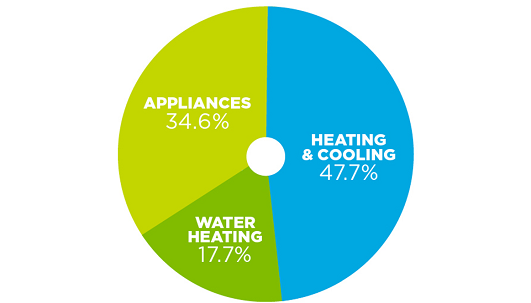Reduce Your Energy Usage While Staying Comfortable

If you live in an area that experiences seasons, you probably know that energy usage tends to go up in the summer and the winter. When the weather dips below freezing it's natural to crank the heat, and during hot summer days people tend to turn their air conditioners on at full blast. When extreme temperatures strike, it takes a significant amount of electricity or natural gas to maintain a comfortable climate indoors.
Heating and cooling account for almost half of the energy use in a typical U.S. home.

SOURCE: Energy.gov Because temperature control, on average, makes up the bulk of a household energy bill, reducing the energy your home uses on heating and cooling is most likely one of your biggest opportunities to control your household energy budget. There are a few things you can do to be more intentional with your heating and cooling, while still staying comfortable at home:
Determine your home’s comfort threshold.
What temperature is most comfortable for your family? Finding ways to warm up (blankets and sweaters) or cool down (cold drinks and lighter clothing) that don’t involve adjusting the thermostat can help keep your energy usage on track.
Maintain your furnace filters
Furnace filters clean your home’s air of the dust, allergens, and toxins that make it in when we open the windows and doors, and track things in from outside. Carpet and furniture can add to the mixture in the air, too, so considering all of the sources of dust, a fresh filter is one of your furnace’s best defenses.
Insulate your home to keep the air in.
Reinsulating your home is certainly a project you’ll need to plan and budget for. If you’re not ready for a full on insulation project, there are ways to keep your home cool in the summer and warmer in the winter without adjusting your thermostat. In the winter, install window coverings to keep warm air from slipping out and cold air from seeping in. In the summer, use ceiling fans and exhaust fans to keep moisture at bay – just make sure to turn them off when you’re not in the room.
Stick to the seasonal baseline temperatures.
Keeping your thermostat set at optimum temperatures throughout the year can keep your efficiency high and your energy spending low.
- For winter time (or a cold spring/fall) set your thermostat to top out at 68 degrees.
- In the summer time (or a warm spring/fall), set your thermostat to 78 degrees. If you’ll be away from home for more than 4 hours at a time, consider raising the temperature to 88 degrees, as each degree can save between 6 and 8 percent on your energy bill.
Upgrade your thermostat.
Upgrading your thermostat can make saving energy and money even easier. In fact, we think that an efficient thermostat is the key to helping homeowners efficiently manage their heating and cooling. There are a lot of different kinds of thermostats available on the market that have a variety of features. Some offer smartphone control capabilities that allow you to check in on and adjust the temperature of your home from anywhere you have mobile service. If you don’t want to worry about manually programming a thermostat, there are some models, like the Nest Learning Thermostat, that have advanced algorithms that can learn your temperature behaviors and help create a schedule for you.
Program your thermostat.
No matter what thermostat you choose, evaluating your family’s schedule can help you identify the biggest opportunities in your energy budget.
What is your daytime schedule?
Think about when your home is empty throughout the day. Do you work a job that takes you to an office for 8 hours? Adjusting the thermostat to an energy-saving temperature (typically 7-10 degrees down in winter, up in summer) can save between 5 and 15 percent a year.
When are your bed times and wake up times?
The optimum sleeping temperature for people is approximately 65 degrees. So, especially in the winter, adjusting your temperature overnight can make a big difference in your energy usage. Consider bringing down your nighttime temperature an hour or so before bed and then set it to come back to the baseline temperature a couple of hours before wake up time. In the summertime, changing to lighter sheets and blankets, using a ceiling fan or box fan, and opening windows on cool nights can take the stress off of your air conditioner.
We’re Here to Help.
Taking control of your thermostat is a great way to start taking control of your energy budget. At IGS Energy, we want to help you protect your budget even more. We offer a wide variety of fixed rate contract options that allow you to lock in a rate. A fixed rate contract protects you from any unexpected price increases and guarantees that your price will remain unchanged for the defined term of agreement, helping you take more control over your budget.